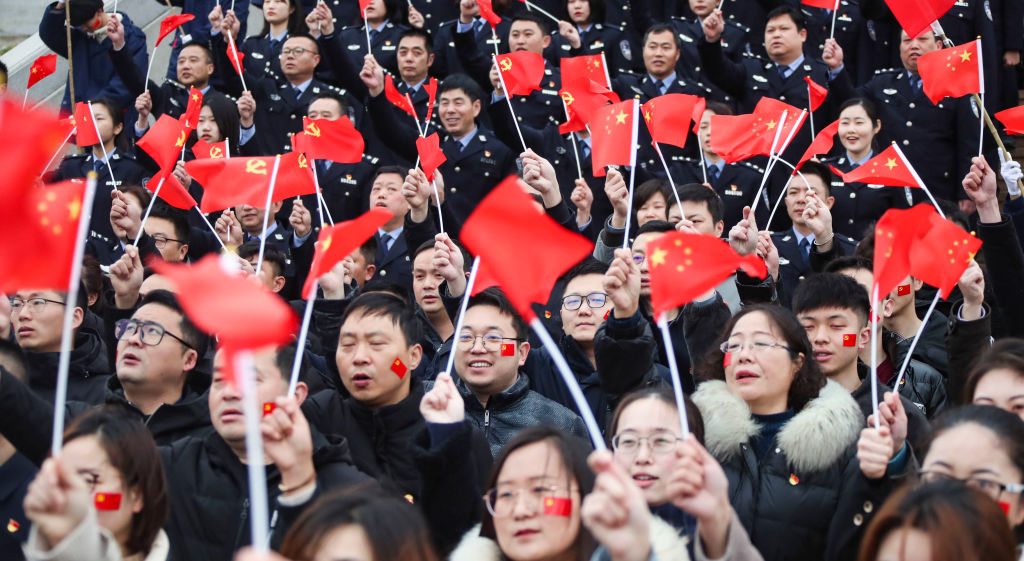China’s new nationalism problem
Posted By Andrew Forrest on August 19, 2021 @ 14:50

Conceptions of the virtues of a historically China-centric regional order are now deeply ingrained in Chinese society, not least among a new generation of Chinese taught from infancy the importance of personally resisting external threats to China’s great rejuvenation.
For better or worse, this new generation is never going to be collectively known for its dispassionate introspection into the sources of its opinions on China’s international behaviour—and China’s leaders know that.
Theirs is, it seems, an aggressively restless generation that expects to live to see China kick the United States out of Asia and everything that follows. It is used to being locked into a position of strategic antagonism with everyone and willing to inflame tensions between China and its neighbours when required—or even just for fun.
While clearly a product of their own imagination, it’s worth thinking about how China’s leaders really feel about this phenomenon right now.
With new global public interest in China-related security challenges, and anti-West nationalist sentiment surging in China on the back of the Covid-19 pandemic and overt competition with the US, I suspect they would be quietly spraying WD-40 on the levers of domestic control to make sure they work when pulled.
They would have by now accepted that China’s social and traditional media controls cannot prevent domestic exposure to all unpopular external opinion on China, thereby making everyone everywhere to some degree receptive to the concerns of others. And they would be thinking carefully about what that means for the ways in which power, interests and identities come together to inform China’s views of itself and others.
In short, they would not quite know what to expect next.
Figuring out the ways in which this generation of Chinese is shaped by external inputs is now less important given how homogeneous it has already become. No outsider can confidently claim to know the answer to this question, and I doubt even China’s leaders themselves know for sure.
What we do know is that the domestic legitimacy of China’s leaders now depends in part on their ability to manage and (if that’s too hard) meet popular expectations of the Chinese Communist Party’s role in improving the nation’s global standing.
China’s ability to defend itself against external forces must, to the party, be the defining force for change in the region and the world, because if it isn’t, something else will be, and that could make the party look reactive and weak. To Xi Jinping, all serious questions of power and cooperation still need to be framed in terms of external struggle.
The problem right now, though, for China’s leaders is that they’re coming off a rough trot in terms of external engagement, which will have forced internal re-examination of many key judgements and approaches.
China’s campaign of economic coercion against Australia has failed, and the weirdly prolonged phase of hyperaggressive global diplomacy has made it harder for China’s leaders to get other countries to openly defer to their interests—something long seen domestically as a symbol of the country’s international worth.
Beijing also erred in seeking to portray external Covid-19-related criticism as an ethnocentric attack on all Chinese everywhere, which among other serious things looked like an attempt to avoid responsibility for the outbreak of the virus.
Given this, from now until the 2022 Winter Olympics, China’s leaders could be forgiven for not wanting demonstrations of international strength for domestic political purposes to be the biggest consideration that shapes China’s international behaviour and diplomatic approaches.
They want some breathing space.
While they would never admit it, greater diversity of popular Chinese views on sensitive issues might oddly be just what China’s leaders need right now. Nobody wants them feeling internally pressured to take bold actions to demonstrate their commitment to the party’s core purpose, least of all bold actions abroad that could spiral out of their control.
It’s far better for everyone, including the rest of the region, if China’s leaders feel like they can demonstrate that commitment by bringing a rogue segment or two of Chinese society into line. But to do that, they’ll need at least some people doing and saying the wrong thing—think young people in Hong Kong.
If China’s leaders do decide that it’s in their interests to lay off everyone except the US for a while, and they can find no fault in the revolutionary zeal of the new generation of Chinese or the newfound obedience of the people of Hong Kong, they may find themselves in the unusual position of looking around for a new target.
The fall of Kabul would have been a welcome distraction for China’s leaders in this respect. But we don’t really want to have to rely on dramatically lost US-led wars to make China feel good about itself.
The overarching concern here is that Taiwan will eventually become the only target that can fill the void. Nobody wants that, including China’s leaders, but the point is that under certain logical and perceptual constraints, it could be considered their only viable option.
I am not too worried about this just yet. After all, creating internal enemies is not a task beyond Beijing’s capabilities. And there are surely still a few among the mainland population who could be a little more genuine and visceral in their display of devotion to the Chinese state.
I hope I’m right.
Article printed from The Strategist: https://www.aspistrategist.org.au
URL to article: https://www.aspistrategist.org.au/chinas-new-nationalism-problem/
Click here to print.